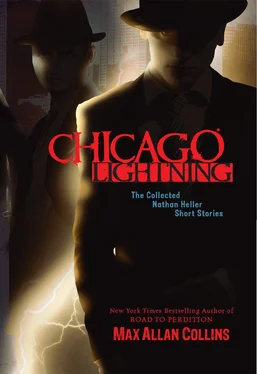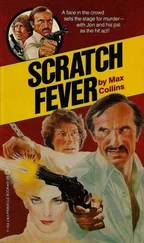Max Collins - Chicago Lightning
Здесь есть возможность читать онлайн «Max Collins - Chicago Lightning» весь текст электронной книги совершенно бесплатно (целиком полную версию без сокращений). В некоторых случаях можно слушать аудио, скачать через торрент в формате fb2 и присутствует краткое содержание. Жанр: Криминальный детектив, на английском языке. Описание произведения, (предисловие) а так же отзывы посетителей доступны на портале библиотеки ЛибКат.
- Название:Chicago Lightning
- Автор:
- Жанр:
- Год:неизвестен
- ISBN:нет данных
- Рейтинг книги:5 / 5. Голосов: 1
-
Избранное:Добавить в избранное
- Отзывы:
-
Ваша оценка:
- 100
- 1
- 2
- 3
- 4
- 5
Chicago Lightning: краткое содержание, описание и аннотация
Предлагаем к чтению аннотацию, описание, краткое содержание или предисловие (зависит от того, что написал сам автор книги «Chicago Lightning»). Если вы не нашли необходимую информацию о книге — напишите в комментариях, мы постараемся отыскать её.
Chicago Lightning — читать онлайн бесплатно полную книгу (весь текст) целиком
Ниже представлен текст книги, разбитый по страницам. Система сохранения места последней прочитанной страницы, позволяет с удобством читать онлайн бесплатно книгу «Chicago Lightning», без необходимости каждый раз заново искать на чём Вы остановились. Поставьте закладку, и сможете в любой момент перейти на страницу, на которой закончили чтение.
Интервал:
Закладка:
His white smile flickered nervously. He adjusted his bowtie with one hand and offered the other for me to shake, which I did. His grip was weak and moist, like his dark eyes.
“Mr. Heller,” he said. “Thank you for stopping by.”
“My pleasure,” I said, stepping into the vestibule, hat in hand.
Earle, snappily dressed in a pinstripe worsted, took my topcoat and hung it on a hall tree.
“Perhaps you don’t remember me,” he said. “I worked in the front office at the fair this summer.”
“Sure I remember you, Mr. Wynekoop.”
“Why don’t you call me ‘Earle.’”
“Fine, Earle,” I said. “And my friends call me ‘Nate.’”
He grinned nervously and said, “Step into the library, Nate, if you would.”
“Is your mother here?”
“No. She’s in jail.”
“Why haven’t you sprung her?” Surely these folks could afford to make bail. On the phone, Earle had quickly agreed to my rate of fifteen bucks a day and one-hundred-dollar non-refundable retainer. And that was the top of my sliding scale.
An eyebrow arched in disgust on a high, unwrinkled brow. “Mother is ill, thanks to these barbarians. We’ve decided to let the state pay for her illness, considering they’ve provoked it.”
He tried to sound indignant through all that, but petulance was the result.
The interior of the house was on the gloomy side: a lot of dark, expensive, well-wrought woodwork, and heavy, plush furnishings that dated back to the turn of the century, when the house was built. There were hints that the Wynekoops might not be as well fixed as the rest of us thought: ornate antiquated light fixtures, worn Oriental carpets and a layer of dust indicated yesterday’s wealth, not today’s.
I sat on a dark horsehair couch; two of the walls were bookcases, filled with leather-bound volumes, and the others were hung with somber landscapes. The first thing Earle did was give me an envelope with one hundred dollars in tens in it. Now Earle was getting himself some sherry off a liquor cart.
“Can I get you something?” Earle asked. His hands were shaking as he poured himself the sherry.
“This will do nicely,” I said, counting the money.
“Don’t be a wet blanket, Nate.”
I put the money-clipped bills away. “Rum, then. No ice.”
He gave me a glass and sat beside me. I’d have rather he sat across from me; it was awkward, looking sideways at him. But he seemed to crave the intimacy.
“Mother’s not guilty, you know.”
“Really.”
“I confessed, but they didn’t believe me. I confessed five times.”
“Cops figured you were trying to clear your mama.”
“Yes. I’m afraid so. I rather botched it, as a liar.”
It was good rum. “Then you didn’t kill your wife?”
“Kill Rheta! Don’t be silly. I loved her, once. Just because our marriage had gone…well, anyway, I didn’t do it, and Mother didn’t do it, either.”
“Who did, then?”
He smirked humorlessly. “I think some moron did it. Some fool looking for narcotics and money. That’s why I called you, Nate. The police aren’t looking for the killer. They think they have their man in Mother.”
“What does your mother’s attorney think?”
“He thinks hiring an investigator is a splendid idea.”
“Doesn’t he have his own man?”
“Yes, but I wanted you. I remembered you from the fair…and, I asked around.”
What did I tell you? Am I detective?
“I can’t promise I can clear her,” I said. “She confessed, after all-and the cops took her one confession more seriously than your five.”
“They gave her the third-degree. A sixty-three-year-old woman! Respected in the community! Can you imagine?”
“Who was the cop in charge?”
Earle pursed his lips in disgust. “Captain Stege himself, the bastard.”
“Is this his case? Damn.”
“Yes, it’s Stege’s case. Didn’t you read about all this in the papers?”
“Sure I did. But I didn’t read it like I thought I was going to be involved. I probably did read Stege was in charge, but when you led this morning, I didn’t recall…”
“Why, Nate? Is this a problem?”
“No,” I lied.
I let it go at that, as I needed the work, but the truth was, Stege hated my guts. I’d testified against a couple of cops, which Stege-even though he was honest and those two cops were bent even by Chicago standards-took as a betrayal of the police brotherhood.
Earle was up pouring himself another sherry. Already. “Mother is a sensitive, frail woman, with a heart condition, and she was ruthlessly, mercilessly questioned for a period of over twenty-four hours.”
“I see.”
“I’m afraid…” And Earle sipped his sherry greedily. Swallowed. Continued: “I’m afraid I may have made the situation even worse.”
“How?”
He sat again, sighed, shrugged. “As you probably know, I was out of town when Rheta was…slain.”
That was an odd choice of words; “slain” was something nobody said, a word in the newspapers, not real life.
“I went straight to the Fillmore police station, when I returned from Kansas City. I had a moment with Mother. I said…” He slumped, shook his head.
“Go on, Earle.”
“I said…God help me, I said, ‘For God’s sake mother, if you did this on account of me, go ahead and confess.’” He touched his fingertips to his eyes.
“What did she say to you?”
“She…she said, ‘Earle, I did not kill Rheta.’ But then she went in for another round with Captain Stege, and…”
“And made that cockamamie confession she later retracted.”
“Yes.”
“Why did you think your mother might have killed your wife for you, Earle?”
“Because…because Mother loves me very much.”
Dr. Alice Lindsay Wynekoop had been one of Chicago’s most esteemed female physicians for almost four decades. She had met her late husband Frank in medical college, and with him continued the Wynekoop tradition of care for the ill and disabled. Her charity work in hospitals and clinics was well-known; a prominent clubwoman, humanitarian, a leader in the woman’s suffrage movement, Dr. Wynekoop was an unlikely candidate for a murder charge.
But she had indeed been charged: with the murder of her daughter-in-law, in the basement consultation office in this very house.
Earle led me there, down a narrow stairway off the dining room. In the central basement hallway were two facing doors: Dr. Wynekoop’s office, at left; and at right, an examination room. The door was open. Earle motioned for me to go in, which I did, but he stayed in the doorway.
The room was narrow and wide and cold; the steam heat was off. The dominant fixture was an old-fashioned, brown-leather-covered examination table. A chair under a large stained-glass window, whose ledge was lined with medical books, sat next to a weigh-and-measure scale. In one corner was a medicine and instrument cabinet.
“The police wouldn’t let us clean up properly,” Earle said.
The leather exam table was blood-stained.
“They said they might take the whole damn table in,” Earle said. “And use it in court, for evidence.”
I nodded. “What about your mother’s office? She claimed burglary.”
“Well, yes…some drugs were taken from the cabinet, in here. And six dollars from a drawer…”
He led me across the hall to an orderly office area with a big rolltop desk, which he pointed to.
“And,” Earle said, pulling open a middle drawer, “there was the gun, of course. Taken from here.”
“The cops found it across the hall, though. By the body.”
“Yes,” Earle said, quietly.
“Tell me about her, Earle.”
Читать дальшеИнтервал:
Закладка:
Похожие книги на «Chicago Lightning»
Представляем Вашему вниманию похожие книги на «Chicago Lightning» списком для выбора. Мы отобрали схожую по названию и смыслу литературу в надежде предоставить читателям больше вариантов отыскать новые, интересные, ещё непрочитанные произведения.
Обсуждение, отзывы о книге «Chicago Lightning» и просто собственные мнения читателей. Оставьте ваши комментарии, напишите, что Вы думаете о произведении, его смысле или главных героях. Укажите что конкретно понравилось, а что нет, и почему Вы так считаете.












